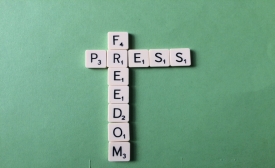freedom of press

In his new book, USC Annenberg's Mike Annany explores how to ensure press freedom, counter disinformation and ensure the public's right to hear.
The Paper is a new media success story in a fast-changing marketplace for news. It covers contentious issues — such as official corruption and a recent scandal involving improperly stored vaccines — with a clutch of digital bells and whistles. Its smartphone app, it says, has been downloaded about 10 million times.
Media freedom is the moral equivalent of oxygen. It is how any free, healthy, vibrant and functioning society breathes, and it is essential to building civil societies. That applies to everything we say in public squares or type on our keyboards online.
As you all know, World Press Freedom Day is approaching next Friday, May 3rd. You might remember that last year, we launched our first Free the Press campaign to commemorate World Press Freedom Day, where we highlighted cases of journalists on humanrights.gov, profiling those targeted by governments as a result of their free expression. We're going to continue that practice again this year.
NEWLY appointed US Ambassador to Swaziland Makila James yesterday met editors and senior journalists from various media houses... She said her government firmly believed that a free press was critical to the success of any democratic society. “In order for our society to thrive, citizens need accurate, timely and independent news,” she said.
This past week, the Iraqi Communications and Media Commission ordered the closure of 44 foreign and domestic media outlets in the country. Among them was the Voice of America, a U.S.-run news organization and quite possibly our biggest public diplomacy tool.
The United States Department of State has Foreign Press Centers in Washington, D.C. and New York that help foreign media cover the U.S. Their goal is to promote the depth, accuracy, and balance of foreign reporting for the U.S., by providing direct access to authoritative American information sources.
It looks great on paper. But there is no transparency. There are no benchmarks and no opportunities for public input or oversight...The talks are used as a public relations exercise that allow the EU to isolate human rights issues from other top-level negotiations.







